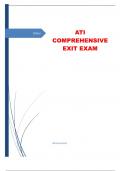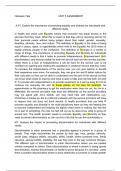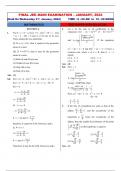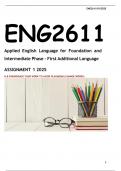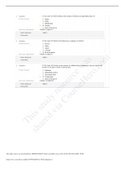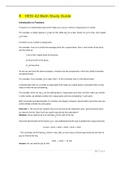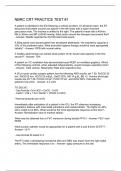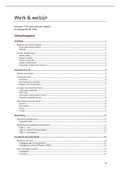PHOTOSYNTHESIS Light dependent photosynthesis
- In thylakoids, uses H2O
6CO2 + 6H2O + C6H12O6 + 6O2 - Produces ATP (transfers energy to LIR), NADPH
Carbon dioxide + water glucose + oxygen transfers H to LIR
Photosynthesis Noncyclic photophosphorylation
- Light energy converted to chemical energy - Photosystem II (P680) then photosystem I (P700)
- Carbon-hydrogen bonds = strong, release los of - Light energy absorbed excites e- at reaction centre,
energy if broken, need lots of energy to form and move along ETC
- Use energy in bonds for AT, anabolic reactions, move (If too much light energy, florescence emitted)
- Coenzymes = NADP transfers H, reduce / oxidise - ATP by chemiosmosis: as e- lose energy, used to
- Compensation point = no net change of carbos transport H+ into thylakoid via proton pumps,
(photosynthesis = respiration) protons move down conc into stroma via enzyme ATP
synthase, energy from movement combines ADP with
Phosphorylation = adding phosphate Pi = ATP
Photophosphorylation = adding phosphate uses light - Light energy absorbed by PSI which excites electrons,
Photolysis = splitting using light energy e- lost are replaced from PSII
Hydrolysis = splitting using water - Leaving e- and H+ are transferred to NADP with H+ =
Decarboxylation = remove CO2 NADPH (coenzyme)
Dehydrogenation = remove H
Redox = OIL RIG (electrons or proton H+)
Chloroplasts
Chloroplasts
- Double membrane
- Thylakoids, grana, lamellae, stroma (starch grains, oil
droplets, small ribos, own DNA)
- Have own DNA in stroma (circular)
Chlorophyll
- Chlorophyll in thylakoid membranes Photolysis
- Pigment molecules absorb different wavelengths - Light energy splits water
- Chlorophyll absorbs red + blue, reflects green - Electrons replace e- lost at PSII
- Chlorophyll A = primary pig in reaction centre - H+ to stroma + combine with NADP = NADPH
(maintain proton grad across thylakoid mem)
Photosynthetic pigments
- Absorb light energy H2O 2H+ + 2e- + 1/2O2
- Pigment + protein = photosystem
- Accessory pigments transfer light energy to reaction Cyclic photophosphorylation
centre (Chlorophyll B, xanthophylls, carotenoids) - Electrons returned to PSI
- Only form ATP no NADPH
Chromatography: separating pigments
1) Grind up leaves with anhydrous sodium sulphate
2) Liquid to test tube + add petroleum ether
3) Liquid from top layer (pig), anhydrous sodium sulphat
4) Draw pencil line, add conc spot (let dry)
5) Place in solvent + add lid, separate
6) Rf = pigment / solvent
- In thylakoids, uses H2O
6CO2 + 6H2O + C6H12O6 + 6O2 - Produces ATP (transfers energy to LIR), NADPH
Carbon dioxide + water glucose + oxygen transfers H to LIR
Photosynthesis Noncyclic photophosphorylation
- Light energy converted to chemical energy - Photosystem II (P680) then photosystem I (P700)
- Carbon-hydrogen bonds = strong, release los of - Light energy absorbed excites e- at reaction centre,
energy if broken, need lots of energy to form and move along ETC
- Use energy in bonds for AT, anabolic reactions, move (If too much light energy, florescence emitted)
- Coenzymes = NADP transfers H, reduce / oxidise - ATP by chemiosmosis: as e- lose energy, used to
- Compensation point = no net change of carbos transport H+ into thylakoid via proton pumps,
(photosynthesis = respiration) protons move down conc into stroma via enzyme ATP
synthase, energy from movement combines ADP with
Phosphorylation = adding phosphate Pi = ATP
Photophosphorylation = adding phosphate uses light - Light energy absorbed by PSI which excites electrons,
Photolysis = splitting using light energy e- lost are replaced from PSII
Hydrolysis = splitting using water - Leaving e- and H+ are transferred to NADP with H+ =
Decarboxylation = remove CO2 NADPH (coenzyme)
Dehydrogenation = remove H
Redox = OIL RIG (electrons or proton H+)
Chloroplasts
Chloroplasts
- Double membrane
- Thylakoids, grana, lamellae, stroma (starch grains, oil
droplets, small ribos, own DNA)
- Have own DNA in stroma (circular)
Chlorophyll
- Chlorophyll in thylakoid membranes Photolysis
- Pigment molecules absorb different wavelengths - Light energy splits water
- Chlorophyll absorbs red + blue, reflects green - Electrons replace e- lost at PSII
- Chlorophyll A = primary pig in reaction centre - H+ to stroma + combine with NADP = NADPH
(maintain proton grad across thylakoid mem)
Photosynthetic pigments
- Absorb light energy H2O 2H+ + 2e- + 1/2O2
- Pigment + protein = photosystem
- Accessory pigments transfer light energy to reaction Cyclic photophosphorylation
centre (Chlorophyll B, xanthophylls, carotenoids) - Electrons returned to PSI
- Only form ATP no NADPH
Chromatography: separating pigments
1) Grind up leaves with anhydrous sodium sulphate
2) Liquid to test tube + add petroleum ether
3) Liquid from top layer (pig), anhydrous sodium sulphat
4) Draw pencil line, add conc spot (let dry)
5) Place in solvent + add lid, separate
6) Rf = pigment / solvent

